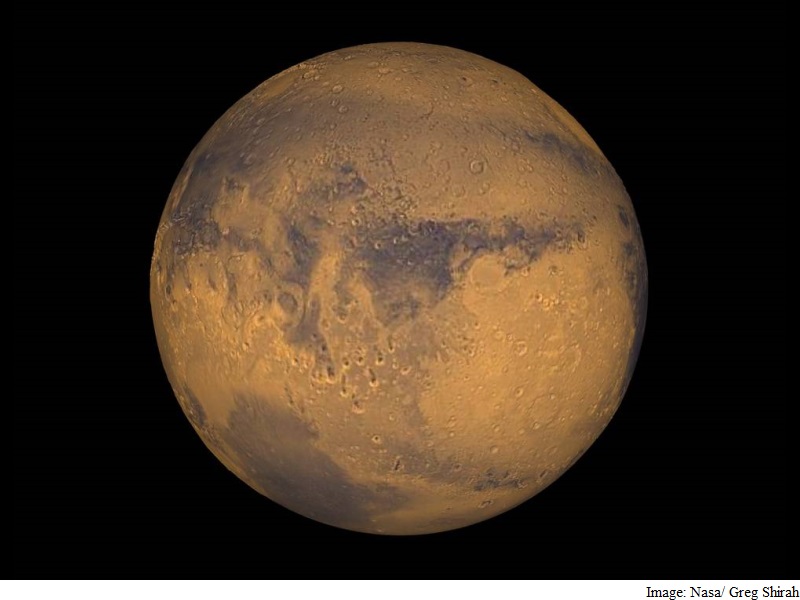- Home
- Science
- Science News
- Mars Surface 'More Uninhabitable' Than Thought: Study
Mars Surface 'More Uninhabitable' Than Thought: Study

Hopes of finding life on Mars, at least on the surface, were dealt a blow Thursday by a study revealing that salt minerals present on the Red Planet kill bacteria.
In lab tests on Earth, the compounds known as perchlorates killed cultures of the bacteria Bacillus subtilis, a basic life form, a research duo from the University of Edinburgh's School of Physics and Astronomy reported.
Perchlorates, stable at room temperature, become active at high heat. Mars is very cold.
In the new study, Jennifer Wadsworth and Charles Cockell showed the compound can also be activated by UV light, without heat, in conditions mimicking those on the martian surface.
It killed bacteria within minutes, said the team, implying the planet was "more uninhabitable than previously thought."
"If we want to find life on Mars, we have to take this into consideration and look at trying to find sub-surface life that wouldn't be exposed to these conditions," Wadsworth told AFP.
Perchlorates are natural and man-made on Earth, but are more abundant on Mars where they were first recorded by NASA's Phoenix Lander in 2008.
The fact that perchlorates killed B. subtilis in the presence of UV radiation did not necessarily mean that all other life forms would similarly die, said Wadsworth. Further tests would have to be done to confirm this.
Perchlorates have previously been spotted in lines, thought to be brine streaks, on the surface of Mars.
Their presence was presented as evidence by scientists in 2015 of liquid water on the Red Planet.
But the new study said brine seeps, "although they represent local regions of water availability, could be deleterious to cells" if they contain perchlorates.
The findings do contain some good news.
They mean that organic contaminants left on Mars by robotic exploration, of which B. subtilis is a common one, are unlikely to survive long.
It is widely accepted that the Red Planet once hosted plentiful water in liquid form, and still has water today, albeit frozen in ice underground.
Liquid water is a prerequisite for life as we know it.
For the latest tech news and reviews, follow Gadgets 360 on X, Facebook, WhatsApp, Threads and Google News. For the latest videos on gadgets and tech, subscribe to our YouTube channel. If you want to know everything about top influencers, follow our in-house Who'sThat360 on Instagram and YouTube.
Related Stories
- Samsung Galaxy Unpacked 2025
- ChatGPT
- Redmi Note 14 Pro+
- iPhone 16
- Apple Vision Pro
- Oneplus 12
- OnePlus Nord CE 3 Lite 5G
- iPhone 13
- Xiaomi 14 Pro
- Oppo Find N3
- Tecno Spark Go (2023)
- Realme V30
- Best Phones Under 25000
- Samsung Galaxy S24 Series
- Cryptocurrency
- iQoo 12
- Samsung Galaxy S24 Ultra
- Giottus
- Samsung Galaxy Z Flip 5
- Apple 'Scary Fast'
- Housefull 5
- GoPro Hero 12 Black Review
- Invincible Season 2
- JioGlass
- HD Ready TV
- Laptop Under 50000
- Smartwatch Under 10000
- Latest Mobile Phones
- Compare Phones
- Redmi Turbo 4
- Vivo Y200+
- Lava Yuva 2 5G
- OnePlus Ace 5
- OnePlus Ace 5 Pro
- Oppo A5 Pro 5G
- Vivo Y29 5G
- Honor Magic 7 RSR Porsche Design
- Asus Zenbook S 14
- MacBook Pro 16-inch (M4 Max, 2024)
- Honor Pad X9 Pro
- Honor Pad V9
- boAt Enigma Gem
- boAt Enigma Daze
- Sony 65 Inches Ultra HD (4K) LED Smart TV (KD-65X74L)
- TCL 55 Inches Ultra HD (4K) LED Smart TV (55C61B)
- Sony PlayStation 5 Pro
- Sony PlayStation 5 Slim Digital Edition
- Blue Star 1.5 Ton 3 Star Inverter Split AC (IC318DNUHC)
- Blue Star 1.5 Ton 3 Star Inverter Split AC (IA318VKU)

















